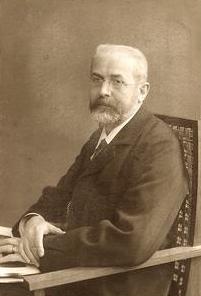Ferdinand Georg Frobenius (nonfiction): Difference between revisions
Jump to navigation
Jump to search
(Created page with "Ferdinand Georg Frobenius (26 October 1849 – 3 August 1917) was a German mathematician, best known for his contributions to the theory of elliptic functions, differential eq...") |
No edit summary |
||
| (2 intermediate revisions by the same user not shown) | |||
| Line 1: | Line 1: | ||
Ferdinand Georg Frobenius (26 October 1849 – 3 August 1917) was a German mathematician | [[File:Georg_Frobenius.jpg|thumb|Ferdinand Georg Frobenius (circa 1900).]]'''Ferdinand Georg Frobenius''' (26 October 1849 – 3 August 1917) was a German [[Mathematician (nonfiction)|mathematician]] who made contributions to the theory of elliptic functions, differential equations, and group theory. | ||
He is known for the famous determinantal identities, known as Frobenius–Stickelberger formulae, governing elliptic functions, and for developing the theory of biquadratic forms. | |||
He was also the first to introduce the notion of rational approximations of functions (nowadays known as Padé approximants), and gave the first full proof for the Cayley–Hamilton theorem. | |||
He also lent his name to certain differential-geometric objects in modern mathematical physics, known as Frobenius manifolds. | |||
== In the News == | == In the News == | ||
| Line 7: | Line 13: | ||
== Fiction cross-reference == | == Fiction cross-reference == | ||
* [[Mathematics]] | |||
== Nonfiction cross-reference == | == Nonfiction cross-reference == | ||
* [[Konrad Knopp (nonfiction)]] - Doctoral student | |||
* [[Ernest Kummer (nonfiction)]] - Doctoral advisor | |||
* [[Edmund Landau (nonfiction)]] - Doctoral student | |||
* [[Mathematician (nonfiction)]] | * [[Mathematician (nonfiction)]] | ||
* [[Walter Schnee (nonfiction)]] - Doctoral student | |||
* [[Issai Schur (nonfiction)]] - Doctoral student | |||
* [[Karl Weierstrass (nonfiction)]] - Doctoral advisor | |||
External links: | External links: | ||
* [https://en.wikipedia.org/wiki/Ferdinand_Georg_Frobenius Ferdinand Georg Frobenius] @ Wikipedia | * [https://en.wikipedia.org/wiki/Ferdinand_Georg_Frobenius Ferdinand Georg Frobenius] @ Wikipedia | ||
[[Category:Nonfiction (nonfiction)]] | [[Category:Nonfiction (nonfiction)]] | ||
[[Category:Mathematicians (nonfiction)]] | [[Category:Mathematicians (nonfiction)]] | ||
[[Category:People (nonfiction)]] | [[Category:People (nonfiction)]] | ||
Latest revision as of 21:15, 26 November 2017
Ferdinand Georg Frobenius (26 October 1849 – 3 August 1917) was a German mathematician who made contributions to the theory of elliptic functions, differential equations, and group theory.
He is known for the famous determinantal identities, known as Frobenius–Stickelberger formulae, governing elliptic functions, and for developing the theory of biquadratic forms.
He was also the first to introduce the notion of rational approximations of functions (nowadays known as Padé approximants), and gave the first full proof for the Cayley–Hamilton theorem.
He also lent his name to certain differential-geometric objects in modern mathematical physics, known as Frobenius manifolds.
In the News
Fiction cross-reference
Nonfiction cross-reference
- Konrad Knopp (nonfiction) - Doctoral student
- Ernest Kummer (nonfiction) - Doctoral advisor
- Edmund Landau (nonfiction) - Doctoral student
- Mathematician (nonfiction)
- Walter Schnee (nonfiction) - Doctoral student
- Issai Schur (nonfiction) - Doctoral student
- Karl Weierstrass (nonfiction) - Doctoral advisor
External links:
- Ferdinand Georg Frobenius @ Wikipedia
